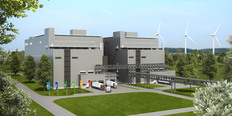- The plant will use precursors from Harjavalta, Finland, and is scheduled to start in 2022.
- The Federal Government and the Land are providing approximately €175 million towards the project.
- The plant will supply materials for around 400,000 electric vehicles annually.
- The new plant will create around 150 jobs in Schwarzheide.

Project Overview
BASF has initiated the construction of a new cathode active materials production plant in Schwarzheide, Germany. This facility is part of BASF’s strategic investment in the European battery materials market and will utilize precursors from its plant in Harjavalta, Finland. The construction began in August and the plant is expected to be operational by 2022.
Investment and Support
The project has received significant financial backing, with the Federal Government and the Land contributing approximately €175 million. This investment is part of the “Important Project of Common European Interest (IPCEI)” approved by the European Commission, aimed at establishing a robust European battery production value chain.
Production Capacity and Environmental Impact
Once operational, the Schwarzheide plant will have the capacity to supply materials for around 400,000 electric vehicles annually. The facility will employ advanced manufacturing processes and a high share of renewable energy, resulting in a 30% lower CO2 footprint compared to conventional industry standards. Efforts on recycling are expected to further reduce the CO2 footprint by up to 60%.
Economic and Regional Impact
The new plant will create approximately 150 jobs, contributing to the economic development of the Lusatia region. This investment is seen as a milestone in the region’s transformation into an innovative industrial hub, providing high-quality employment opportunities and supporting structural change.
Strategic Importance
The establishment of this plant is a critical step in building a competitive and sustainable battery cell manufacturing value chain in Europe. It aligns with the European Commission’s agenda to enhance Europe’s resilience and accelerate the green transition, ensuring the region remains competitive in the global market.

